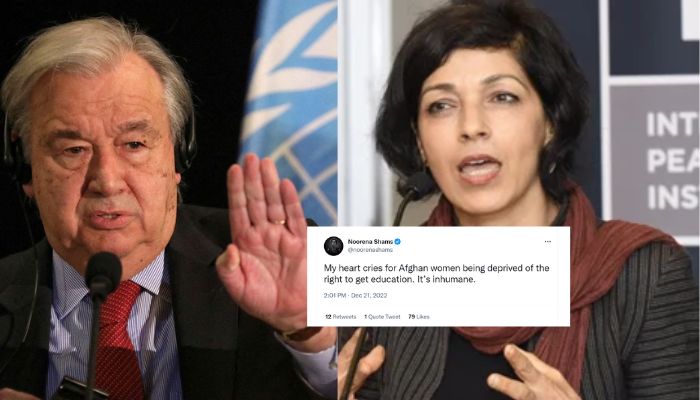[ad_1]

Afghanistan's Taliban-run higher education ministry on Tuesday suspended access to universities by female students until further notice, drawing strong condemnation from across the globe.
A letter, confirmed by a spokesperson for the higher education ministry, instructed Afghan public and private universities to suspend access to female students immediately, in accordance with a Cabinet decision.
The announcement by the Taliban administration, which has not been internationally recognised, came as the United Nations Security Council met in New York on Afghanistan.
Hundreds of young women were stopped by armed guards on Wednesday from entering Afghan university campuses, a day after the nation's Taliban rulers banned them from higher education in another assault on human rights.
Despite promising a softer rule when they seized power last year, the Taliban have ratcheted up restrictions on all aspects of women's lives, ignoring international outrage.
Many, dressed in hijabs, were also seen standing in groups on roads leading to the campuses.
Pakistan urged Afghanistan to revisit its decision to suspend university and higher education for female students, expressing disappointment at the country's step.
“We strongly believe that every man and woman has the inherent right to education in accordance with the injunctions of Islam,” an official statement from the Foreign Office read, emphasising that Pakistan is “disappointed” to learn about the suspension.
Pakistani squash player Noreena Shams appreciated Afghan men “standing in solidarity with Afghan women” who refused to take exams to protest. She added that the decision was “inhumane”.
A spokesperson told TRT World that UN chief Antonio Guterres said he was “deeply alarmed” by the ban. Guterres urged authorities to “ensure equal access to education at all levels”.
Britain's UN Ambassador Barbara Woodward said the suspension was “another egregious curtailment of women's rights and a deep and profound disappointment for every single female student.”
“There is not much the world can do when it comes to the Taliban's mentality,” said Ahmad Shah Mohibi of Rise to Peace, who added that the decision was neither Islamic nor cultural and it goes against the teachings of Prophet Muhammad (PBUH) and the Holy Quran.
“The world must reject, as Afghans have, that this is about culture or religion,” said US special envoy Rina Amiri, adding that “as a global community, we must take a firm stand against these extreme policies.”
UN spokesman Stephane Dujarric said the move on Tuesday was “clearly another broken promise from the Taliban.”
“It's another very troubling move and it's difficult to imagine how the country can develop, deal with all of the challenges that it has, without the active participation of women and the education of women,” he told reporters in New York.
The Diplomatic Missions of Afghanistan condemned the ruling, saying that the decision was in “grave violation of Islamic values”.
“The Taliban cannot expect to be a legitimate member of the international community until it respects the human rights and fundamental freedoms of Afghan women and girls,” a US government spokesperson remarked.
The ambassador of Afghanistan to Sri Lanka said that “victimizing Afghan women further would never secure Taliban international recognition.”
Liberal Senate Leader, Shadow Foreign Minister & Senator for South Australia, Simon Birmingham called the decision “appalling”.
“The banning of women from higher education is completely unacceptable! It is unjust and unjustified,” Nature‘s Editor in Chief said.
UN special envoy for Afghanistan Roza Otunbayeva said the closure of high schools had “undermined” the Taliban administration's relationship with the international community and was “extremely unpopular among Afghans and even within the Taliban leadership.”
Additional input from Reuters.
[ad_2]
Source link


